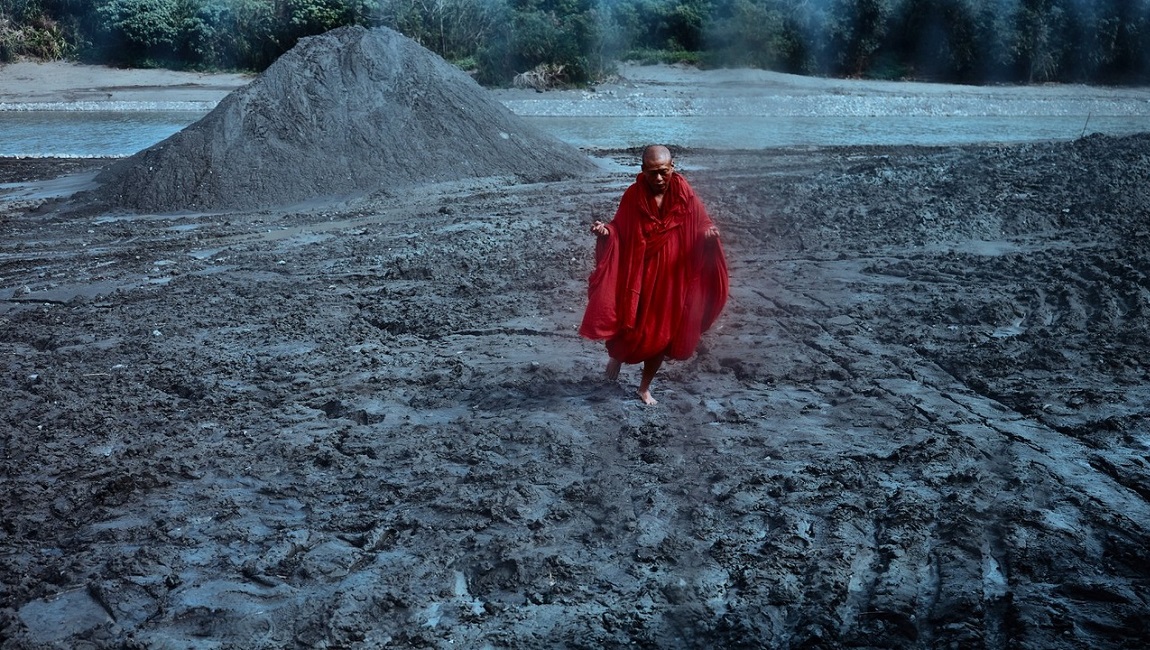New Directors/New Films takes a certain amount of pride in the names they’ve launched, and it’s not unjustified: any festival that can boast Hou Hsiao-Hsien, Spike Lee, and Kelly Reichardt has done their job well. Viewers with an interest in the experimental side of the film world, however, might note that the list of their alumni is rather light on short-form works and avant-gardists. Even considering that more people viewing their website will know Wong Kar-wai than Simon Liu, it’s a testament to the conservative approach of their short film programming. Past installments of ND/NF have promoted the occasional experimental artist of note in their shorts programs, but there’s also an excessive fondness for narrative short films, a largely dead-end approach to conveying characterization that’s rarely ever succeeded and which is now largely utilized as a calling card for a subsequent feature. When combined with the fact that most directors (let alone new ones) either can’t or won’t use more radical formal approaches, it serves to expose the flip side of the coin in supporting new artists: some are just settled for, in the hopes that they’ll eventually make something better with the publicity.
Shorts Program II of the 2024 edition of ND/NF seems to be the more experimentally oriented of the two, although that’s all relative. Nobody in this grouping settled for just shooting a classical narrative project per se, and even if that only intermittently translates into all of the promise of a new director making a new film, the ones who attempted to venture further out and made actual experiments are nevertheless a step in the right direction of recognizing what could come next for the medium and programming accordingly. A paradox baked into this grouping is that the one title in the group that will screen on supposedly obsolete celluloid had the greatest deliverance of new ideas and pleasures in its form, while the film that tried the hardest to be current just tried hard. If one judges short film programs on their strongest contribution, then it’s a must-see, and one suspects that the festival knew it: they saved it for last. The overall collection, perhaps inevitably, has the hit-and-miss quality of any anthology work.
Juliana Zuluaga’s The Night of the Minotaur is constructed around black-and-white archival footage, with the director narrating the story of Luz Emilia García, the director’s grandmother, while also utilizing old stag films to make the claims that she was “the last minotaur” in the primordial lusts of her proto-pornography work. She leans into the sinister qualities of archival footage by playing with video dropouts, frame damage, and a score that lends a dark ambiance to musings such as her grandmother’s inability to bear a son and her grandfather’s unusually pale skin. Zuluaga has a good handle on how to keep this stylistically consistent without making it monotonous, in part because the old pornographic footage being so clearly of a certain vintage is legitimately startling: the strongest material features explicit references to Satanism, and bears some resemblance to certain segments of Pasolini’s Salo. However, said material comes from relatively well-known and decidedly un-Colombian sources, namely the 1928 French pornographic film Messe Noire, and this knowledge makes the effect more synthetic than primordial.
Lou Fauroux’s deeply tiresome The Porn Selector threatens to be the first entry in a project, “The Internet Collapse,” asking if there’s life after the Internet. Following a barrage of alarms and announcements that the World Wide Web is going down forever, a character begins meditating with the grammatically dubious proclamation, “I am alive despite the World Wide Web is going to die, I am capable to live without the Internet.” Once she declares that Internet shopping helps her solve all her problems (so much for being capable to live without the Internet?), we know we’re in Adam McKay territory. Some of the more notable features of this universe include a cryptocurrency called “Buttcoin” and a barrage of deliberately tacky digital effects that are surprisingly retro for something straining so hard for commentary on the current moment. Some of Fauroux’s choices are clearly meant to be uncanny or alienating (such as the aforementioned grammatical errors), but that’s about all the credit she’s due for this shrill calling card.
Cameron Worden’s Digital Devil Saga claims to have been designed for the stereoscopic qualities of a 35mm print, with archival print stock specified to ensure the images will remain permanent. It’s an initially curious claim for this carpet bomber of Internet imagery and Chicago rap, which takes the firmly digital individual frames that constitute GIFs, memes, and screenshots and jumbles them up. When they flash by at 24 frames per second, you can occasionally grab hold of a pattern if Worden lets you: screenshots require you to speed-read (one features Worden himself), visual recurrences form mandalas of kitsch, and the illusion of motion in a GIF remains identical, even as the individual frames of Elissa from Big Brother spitting out her water or the cheery gun-waving from Shady’s “Go In” music video get separated by various forms of clutter. You could have a field day playing this in slow motion if you memorized the lyrics of the Chicago rap songs that tie it all together (one song’s lyrics play off a sequence devoted to Mario Kart nicely). The approach isn’t new and isn’t meant to be: Tony Conrad’s classic The Flicker and its doctor’s warning make a cameo, Owen Land’s pissy humor manifested in a similar formal approach for the structuralist A Film of Their 1973 Spring Tour Commissioned by Christian World Liberation Front of Berkeley, California, and Cameron shares his last name with Fred Worden, whose film One settled for taking apart a single image. Land’s film, and his body of work as a whole, is perhaps the best guide for Digital Devil Saga’s approach: that of a joker who favored visuals that resembled the bland look of educational films in order to play his own kind of tricks. Worden latches onto a different kind of visual blandness by prying open the everyday qualities of the Internet and rendering our daily sensation of being barraged by screens into a time-based form: you have to put up with this every day, but is it so much more difficult when it’s concentrated into 11 sequential minutes of exaggeration? The contrast between this work’s visual-music qualities and the ugliness of the individual frame-notes makes it one of the more counterintuitive works built around the principles of sampling. It’s not the first work to take the approach of exaggerating contemporary kitsch rather than isolating moments of great beauty in its approach to pop culture detritus, but it might be the most perfectly executed dive into the sewage tank.
Published as part of New Directors/New Films 2024.







